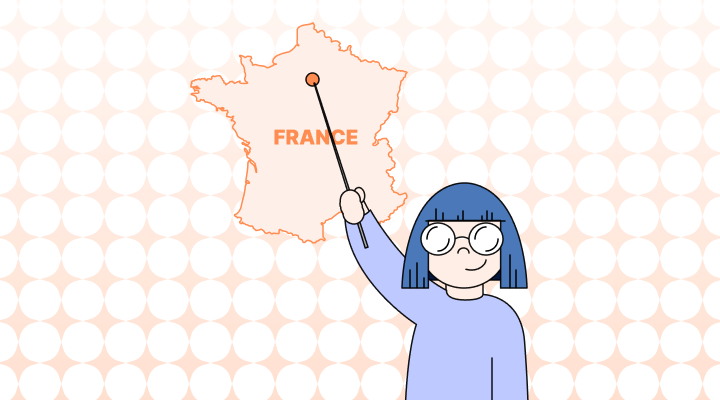The latter, “What is the capital of France?”, is correct.
Articles like a, an, and the are one of the most difficult parts of English for non-native speakers of the language. You may not know which article to use, let alone whether to even use an article or not in front of a certain noun.
Generally, nouns that fulfill these three criteria require an article in front of them:
- Singular
- Countable
- Not a proper noun
In the above sentence, capital checks off all three of these criteria: It is singular, countable, and not a proper noun.
- It is singular because it is one capital not multiple capitals, which is the plural version of the noun.
- It is countable because you can count a number of capitals unlike uncountable nouns like air or luck, which you cannot count in units because you cannot say three airs or four lucks.
- It is not a proper noun because it does not address a particular noun and does not start with a capital letter. Proper nouns are nouns like Paris, John, and Monday, nouns that refer to a specific person, place, or thing.
Therefore, in the sentence above, the article the is needed.
Here are some other examples of nouns that fit the criteria:
- Could you lend me a pencil?
- I washed the car yesterday.
- Billy went to the store on Saturday to buy some milk.
- Dad bought Jamie a book for her birthday.
Pencil, car, store, and book are all singular, countable, and not proper nouns, so they all are preceded with an article.
Now, how do you know which article to use?
Because the sentence in question is referring to a certain capital, the capital of France, using the article the instead of a is correct.
- Correct: What is the capital of France?
- Incorrect: What is a capital of France?
If there were multiple capitals of France, a may be correct, but since there is only one capital of France and the sentence is only referring to that one capital, the is the correct article to use.
You would use the article a when referring to any capital in general like this following example:
- Correct: A capital of a country is determined by that country’s governing body.
If capital was in its plural form capitals, then you would use the in front of it only when referring to specific capitals and no article when referring to capitals in general:
- Correct: The capitals of France and Germany are Paris and Berlin respectively.
- Here, the sentence is referring to the capitals of France and Germany in particular, so the article the is needed.
- Correct: Capitals often house their countries’ government buildings.
- Here, the sentence is referring to capitals in general, so no article is needed.
Note: You would never use a or an in front of the plural noun capitals.
However, there are exceptions, as with most grammar rules for English, to the three criteria.
Singular and countable nouns such as school or class do not require an article before them in some cases.
- Correct: I go to school every weekday.
- Correct: There is a school up on that hill.
- Correct: The school across the street has no playground.
- Correct: Tom bikes to class on Tuesdays and Wednesdays.
- Correct: Jennifer is taking a class on psychology next semester.
- Correct: Our professor taught the class for four consecutive years.
Plural nouns require the article the when referring to a specific set of that noun:
- Cats groom themselves by licking their own fur.
- This refers to cats in general, so the is not needed.
- The cats in the pet store are fed premium cat food.
- This refers to a particular set of cats in a certain pet store, so the is needed.
- Most books are bound with strong glue.
- This refers to books in general, so the is not needed.
- You can check out any of the books in the library with your library card.
- This refers to a particular set of books in a certain library, so the is needed.
Similar to plural nouns, uncountable nouns require the article the when referring to a particular noun.
- Air on Earth is comprised of nitrogen, oxygen, carbon dioxide, neon, hydrogen, and other gases.
- This refers to air on Earth in general, so no article is needed.
- The air in the room felt crisp and cold.
- This refers to the air in the room specifically, so the is needed.
- The store down the street sells furniture and appliances.
- This refers to furniture in general (the store is selling furniture in general).
- Mom dusted the furniture in the living room before the guests came.
- This refers to a particular set of furniture in a certain room, so the is needed.
Although most proper nouns would not need an article before them, there are some exceptions:
- The United States, the Netherlands, the UN, the Atlantic Ocean, etc.
When proper nouns are used to describe another noun, however, you will most likely need an article:
- Correct: English is a complex and unique language.
- Correct: The English language is complex and unique.
- Correct: The NASA researchers presented their findings in a recent convention.
- Correct: NASA announced its findings in a recent convention.
Also refer to our article The or A/An: A Simple Way to Choose the Right One on how to know whether to use the, a, or an.
If you have trouble with articles, try out our free AI-powered online grammar checker Engram to check your grammar and if your English sounds natural to a native speaker. Engram provides immediate results so you do not have to spend time finding and hiring a proofreader.

References:















